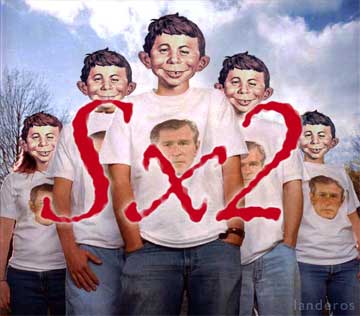|

The S Factor: Part Duh
After the election, national stupidity is more relevant than ever.
- - - - - - - - - -
by Neal Starkman
 N JANUARY 2004, I wrote a somewhat tongue-in-cheek essay called "The S Factor," in which I identified an issue that I believed had been overlooked as a strong determinant of the way people vote. N JANUARY 2004, I wrote a somewhat tongue-in-cheek essay called "The S Factor," in which I identified an issue that I believed had been overlooked as a strong determinant of the way people vote.
The S factor -- short for the Stupid factor -- describes people who don't understand cause and effect, can't handle more than two sides of an issue and don't seek out multiple sources of information. It was my contention that, although the S factor applies to people across the political spectrum, it went a long way to explaining the apparent popularity of President Bush in the face of facts that indicated he was neither competent nor virtuous.
One year later, is the S factor relevant? A survey found that a significant majority of Bush supporters believed that Iraq had either actual weapons of mass destruction or a major program for producing them, that Iraq was providing "substantial" support to al-Qaida and that "most experts" agreed with those conclusions. The corresponding numbers for Sen. John Kerry supporters were far less.
Let's reduce this to the personal: Shortly before the election, NASCAR celebrity Darrell Waltrip explained his support for Bush by saying that he -- Waltrip -- wasn't "an issues guy" but that he'd been impressed by Bush's handshake.
Listen up, folks: Facts, observations and reason are not the currencies in which many people deal.
We've been conditioned to think that if only we could lay down the facts as we know them and make cogent, logical arguments, others would at least understand us, paving the way to some sort of consensus. But it doesn't always work that way. Millions of people respond exclusively to simple solutions for complex problems, think non-linearly and would rather someone else do the hard work of being "the issues guy." For these Americans, it's more important to feel than to think.
That might work well in church or therapy, but it's dysfunctional in the practical world. And it's a partial answer to why Bush garnered so many votes: Can you argue facts or logic with people who still believe that Saddam Hussein masterminded 9/11? Can you argue facts or logic with people who still believe that Bush has made us safer? And can you argue facts or logic with people who believe that handshakes -- or smiles, or haircuts or wives' offhand comments -- trump policies?
Is it any wonder that those who adhere to ask-no-questions, do-as-you're-told-from-on-high faiths consistently favor conservative candidates? Voltaire said, "Faith begins where reason ends." But many people don't even give reason a chance to start.
Let no one doubt the prominence of the S factor. Whether or not it's patronizing to say that doesn't matter; it exists. "Dumbing down" our arguments is not the answer. We have to slide horizontally into another universe and try to figure out a different way to communicate. At the same time, we need to persevere in teaching young people how to think critically. Maybe it's not too late for the next generation.
George Lakoff ("Moral Politics; Don't Think of an Elephant") promotes reframing issues so that people of reactionary bent will listen to what others are saying. He's right. We have to do a lot of reframing, we have to apply stricter standards of truth and accuracy to mass media, we have to transform the apparatus of communication -- the sender, the receiver and the medium itself.
The real battle ahead of us isn't Democrat versus Republican, rural versus urban, conservative versus liberal or even church versus state. It's much more basic than that: The real battle is people who reason versus people who don't.
Reprinted from The Seatle Post Intelligencer

|